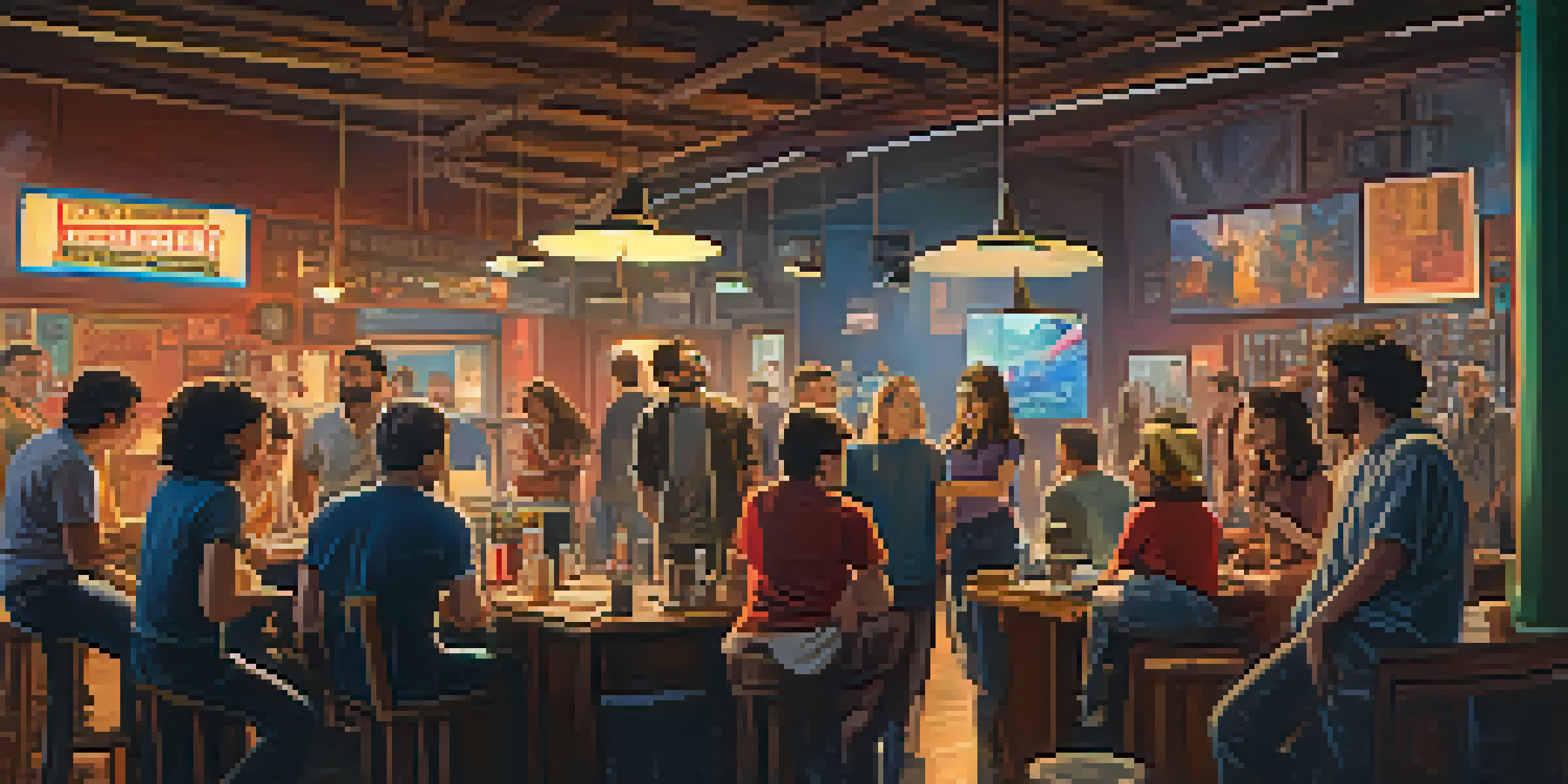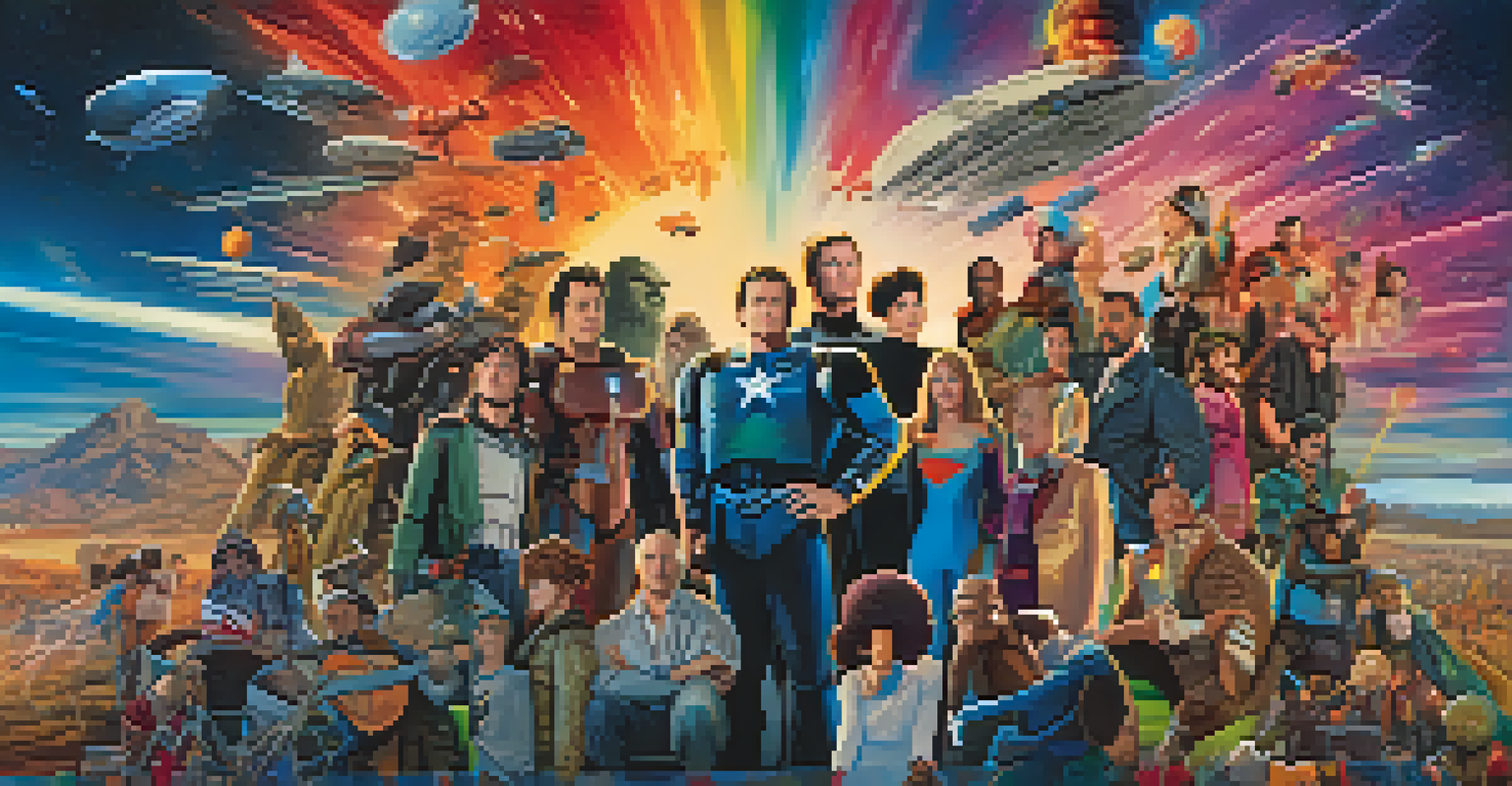Impact of Cinematic Universes on the Modern Film Industry

Understanding Cinematic Universes: A New Film Landscape
Cinematic universes represent a groundbreaking shift in how films are produced and consumed. They allow filmmakers to create interconnected stories, expanding single narratives into broader ones. This approach not only captivates audiences but also encourages them to engage with multiple films and characters, fostering a deeper connection to the franchise.
Storytelling is the ultimate emotional currency. It’s what allows us to connect with one another and to understand our world.
For instance, the Marvel Cinematic Universe (MCU) has successfully merged various superhero stories into one cohesive experience. By doing so, it has transformed the way audiences view sequels and spin-offs, making them essential parts of a larger narrative tapestry. This interconnectedness has sparked a trend that many studios now strive to replicate.
Ultimately, cinematic universes have changed the filmmaking landscape, pushing studios to think strategically about character arcs and plotlines across multiple films. This shift has led to a more collaborative and expansive approach to storytelling, influencing everything from scriptwriting to marketing strategies.
Box Office Success: How Universes Drive Revenue
One of the most significant impacts of cinematic universes is their ability to generate substantial box office revenue. By creating a universe, studios can attract larger audiences eager to see how different characters and plots intertwine. This strategy not only boosts ticket sales for individual films but also increases merchandise and streaming opportunities.

For example, the MCU has consistently broken box office records, with films like 'Avengers: Endgame' grossing over $2.8 billion worldwide. This financial success demonstrates the power of a well-crafted cinematic universe to draw in viewers and keep them invested in the overarching story. The anticipation and excitement surrounding each new release can create a viral marketing effect, amplifying interest across various platforms.
Cinematic Universes Drive Revenue
Cinematic universes attract larger audiences and significantly boost box office sales, as seen with the Marvel Cinematic Universe.
Moreover, the success of these universes has encouraged studios to invest in long-term plans rather than relying solely on standalone films. This shift in focus has reshaped how industry executives measure success and profitability, placing a premium on franchise potential.
Creative Freedom: Expanding Storytelling Horizons
Cinematic universes have also offered filmmakers greater creative freedom when it comes to storytelling. By developing a shared universe, directors and writers can explore complex themes and character dynamics over multiple films. This allows for more nuanced storytelling that resonates with audiences on different levels.
Cinematic universes are a testament to the power of collaboration and shared storytelling in creating a richer entertainment experience.
Take 'Star Wars' as an example; its vast universe has enabled the exploration of various genres, from epic space operas to intimate character dramas. This versatility invites a wider range of creative voices and perspectives, enriching the overall narrative experience. Filmmakers can play with genre conventions and experiment with storytelling techniques without the constraints of traditional standalone films.
As a result, cinematic universes encourage innovation within the industry, prompting filmmakers to push boundaries and explore new ideas. This creative expansion not only benefits the films themselves but also enhances the viewing experience, allowing audiences to engage with the material in diverse and exciting ways.
Fan Engagement: Building Communities Around Stories
Cinematic universes have fostered a unique sense of community among fans, creating opportunities for deeper engagement. Through social media, fan theories, and conventions, audiences can actively participate in the universe, sharing their insights and speculations with others. This interactive element transforms passive viewing into an immersive experience.
For instance, platforms like Reddit and Twitter buzz with discussions about upcoming films, character arcs, and potential crossovers. Fans eagerly dissect trailers and plot hints, contributing to a collective excitement that enhances the anticipation of new releases. This level of engagement can be seen as a form of fandom activism, where audiences feel a sense of ownership over the stories they love.
Creative Freedom for Filmmakers
These universes allow filmmakers to explore complex themes and character dynamics across multiple films, fostering innovation in storytelling.
As a result, studios are increasingly recognizing the importance of fan engagement in shaping their marketing strategies. By tapping into this community-driven momentum, filmmakers can cultivate loyal audiences who eagerly await each new installment, further solidifying the success of their cinematic universes.
The Challenges of Maintaining a Cinematic Universe
While cinematic universes offer numerous benefits, they also come with their own set of challenges. One major hurdle is the risk of audience fatigue, where viewers become overwhelmed by the sheer volume of content. As studios release more films and spin-offs, it can be difficult for audiences to keep up, leading to diminished interest over time.
Additionally, the complexity of intertwining plots and characters can create confusion. If not executed carefully, storytelling can become convoluted, alienating casual viewers who might feel lost in the narrative. Striking the right balance between depth and accessibility is crucial for maintaining audience engagement.
Moreover, the pressure to deliver consistent quality across multiple films can be daunting for filmmakers. The success of a cinematic universe often hinges on each installment's reception, making it essential for studios to prioritize storytelling and character development. The challenge lies in sustaining creativity while meeting audience expectations.
Diversity and Representation in Cinematic Universes
The rise of cinematic universes has also prompted discussions around diversity and representation in film. As these universes expand, there is a growing awareness of the need to include a broader range of voices and perspectives. This shift is crucial for creating relatable narratives that resonate with diverse audiences.
For example, the introduction of characters from various backgrounds and cultures has enriched cinematic universes, providing fans with relatable heroes. The success of films like 'Black Panther' highlights the importance of representation, demonstrating that diverse stories can achieve both critical acclaim and commercial success.
Fan Engagement Builds Communities
Cinematic universes create interactive fan communities that enhance viewer engagement and anticipation for new releases.
By embracing diversity within cinematic universes, studios can foster a more inclusive environment that reflects the world we live in. This commitment not only enhances storytelling but also allows audiences to see themselves represented on screen, contributing to a more meaningful viewing experience.
The Future of Cinematic Universes: Trends to Watch
As cinematic universes continue to evolve, several trends are shaping their future. One notable trend is the increasing reliance on streaming platforms to expand these universes. With the rise of services like Disney+ and HBO Max, there are new opportunities for storytelling beyond traditional films, such as limited series and spin-off shows.
These platforms allow for deeper character exploration and world-building, offering fans more content to enjoy. This shift is altering the way stories are told, enabling filmmakers to adopt a more serialized approach to storytelling that mirrors the episodic nature of television.

Looking ahead, we can expect to see further innovation in how cinematic universes are constructed and marketed. As technology advances, immersive experiences such as virtual reality and interactive storytelling could play a role in redefining audience engagement. The future is bright for cinematic universes, with endless possibilities for creative exploration.